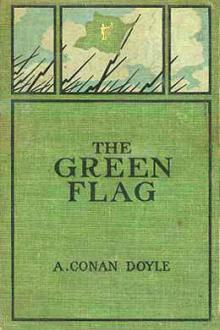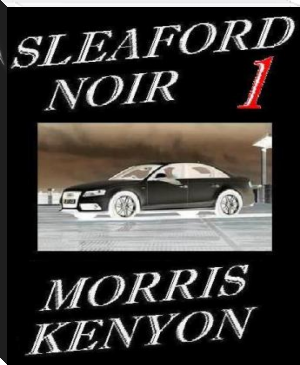The Green Flag, Arthur Conan Doyle [ebook and pdf reader txt] 📗

- Author: Arthur Conan Doyle
- Performer: -
Book online «The Green Flag, Arthur Conan Doyle [ebook and pdf reader txt] 📗». Author Arthur Conan Doyle
"Who is that?" he asked his neighbour, whose spurs and gaiters showed that he was likely to know.
The man stared in astonishment at the stranger's ignorance. "Why, that's Jim Holloway, the great Jim Holloway," said he; then, seeing by the blank look upon Dodds's face that even this information had not helped him much, he went into details. "Sure he's the head of Holloway & Morland, of London," said he. "He's the buying partner, and he buys cheap; and the other stays at home and sells, and he sells dear. He owns more horses than any man in the world, and asks the best money for them. I dare say you'll find that half of what are sold at the Dunsloe fair this day will go to him, and he's got such a purse that there's not a man who can bid against him."
Worlington Dodds watched the doings of the great dealer with interest. He had passed on now to the two-year-olds and three-year-olds, full-grown horses, but still a little loose in the limb and weak in the bone. The London buyer was choosing his animals carefully, but having chosen them, the vigour of his competition drove all other bidders out of it. With a careless nod he would run the figure up five pounds at a time, until he was left in possession of the field. At the same time he was a shrewd observer, and when, as happened more than once, he believed that someone was bidding against him simply in order to run him up, the head would cease suddenly to nod, the note-book would be closed with a snap, and the intruder would be left with a purchase which he did not desire upon his hands. All Dodds's business instincts were aroused by the tactics of this great operator, and he stood in the crowd watching with the utmost interest all that occurred.
It is not to buy young horses, however, that the great dealers come to Ireland, and the real business of the fair commenced when the four and five-year-olds were reached; the full-grown, perfect horses, at their prime, and ready for any work or any fatigue. Seventy magnificent creatures had been brought down by a single breeder, a comfortable- looking, keen-eyed, ruddy-cheeked gentleman who stood beside the sales-man and whispered cautions and precepts into his ear.
"That's Flynn of Kildare," said Dodds's informant. "Jack Flynn has brought down that string of horses, and the other large string over yonder belongs to Tom Flynn, his brother. The two of them together are the two first breeders in Ireland." A crowd had gathered in front of the horses. By common consent a place had been made for Mr. Holloway, and Dodds could catch a glimpse of his florid face and yellow covert-coat in the front rank. He had opened his note-book, and was tapping his teeth reflectively with his pencil as he eyed the horses.
"You'll see a fight now between the first seller and the first buyer in the country," said Dodds's acquaintance. "They are a beautiful string, anyhow. I shouldn't be surprised if he didn't average five-and-thirty pound apiece for the lot as they stand."
The salesman had mounted upon a chair, and his keen, clean-shaven face overlooked the crowd. Mr. Jack Flynn's grey whiskers were at his elbow, and Mr. Holloway immediately in front.
"You've seen these horses, gentlemen," said the salesman, with a backward sweep of his hand towards the line of tossing heads and streaming manes. "When you know that they are bred by Mr. Jack Flynn, at his place in Kildare, you will have a guarantee of their quality. They are the best that Ireland can produce, and in this class of horse the best that Ireland can produce are the best in the world, as every riding man knows well. Hunters or carriage horses, all warranted sound, and bred from the best stock. There are seventy in Mr. Jack Flynn's string, and he bids me say that if any wholesale dealer would make one bid for the whole lot, to save time, he would have the preference over any purchaser."
There was a pause and a whisper from the crowd in front, with some expressions of discontent. By a single sweep all the small dealers had been put out of it. It was only a long purse which could buy on such a scale as that. The salesman looked round him inquiringly.
"Come, Mr. Holloway," said he, at last. "You didn't come over here for the sake of the scenery. You may travel the country and not see such another string of horses. Give us a starting bid."
The great dealer was still rattling his pencil upon his front teeth. "Well," said he, at last, "they are a fine lot of horses, and I won't deny it. They do you credit, Mr. Flynn, I am sure. All the same I didn't mean to fill a ship at a single bid in this fashion. I like to pick and choose my horses."
"In that case Mr. Flynn is quite prepared to sell them in smaller lots," said the salesman. "It was rather for the convenience of a wholesale customer that he was prepared to put them all up together. But if no gentleman wishes to bid—"
"Wait a minute," said a voice. "They are very fine horses, these, and I will give you a bid to start you. I will give you twenty pounds each for the string of seventy."
There was a rustle as the crowd all swayed their heads to catch a glimpse of the speaker. The salesman leaned forward. "May I ask your name, sir?"
"Strellenhaus—Mr. Strellenhaus of Liverpool."
"It's a new firm," said Dodds's neighbour. "I thought I knew them all, but I never heard of him before."
The salesman's head had disappeared, for he was whispering with the breeder. Now he suddenly straightened himself again. "Thank you for giving us a lead, sir," said he. "Now, gentlemen, you have heard the offer of Mr. Strellenhaus of Liverpool. It will give us a base to start from. Mr. Strellenhaus has offered twenty pounds a head."
"Guineas," said Holloway.
"Bravo, Mr. Holloway! I knew that you would take a hand. You are not the man to let such a string of horses pass away from you. The bid is twenty guineas a head."
"Twenty-five pounds," said Mr. Strellenhaus.
"Twenty-six."
"Thirty."
It was London against Liverpool, and it was the head of the trade against an outsider. Still, the one man had increased his bids by fives and the other only by ones. Those fives meant determination and also wealth. Holloway had ruled the market so long that the crowd was delighted at finding someone who would stand up to him.
"The bid now stands at thirty pounds a head," said the salesman. "The word lies with you, Mr. Holloway."
The London dealer was glancing keenly at his unknown opponent, and he was asking himself whether this was a genuine rival, or whether it was a device of some sort—an agent of Flynn's perhaps—for running up the price. Little Mr. Strellenhaus, the same apple-faced gentleman whom Dodds had noticed in the coffee-room, stood looking at the horses with the sharp, quick glances of a man who knows what he is looking for.
"Thirty-one," said Holloway, with the air of a man who has gone to his extreme limit.
"Thirty-two," said Strellenhaus, promptly.
Holloway grew angry at this persistent opposition. His red face flushed redder still.
"Thirty-three!" he shouted.
"Thirty-four," said Strellenhaus.
Holloway became thoughtful, and entered a few figures in his note-book. There were seventy horses. He knew that Flynn's stock was always of the highest quality. With the hunting season coming on he might rely upon selling them at an average of from forty-five to fifty. Some of them might carry a heavy weight, and would run to three figures. On the other hand, there was the feed and keep of them for three months, the danger of the voyage, the chance of influenza or some of those other complaints which run through an entire stable as measles go through a nursery. Deducting all this, it was a question whether at the present price any profit would be left upon the transaction. Every pound that he bid meant seventy out of his pocket. And yet he could not submit to be beaten by this stranger without a struggle. As a business matter it was important to him to be recognised as the head of his profession. He would make one more effort, if he sacrificed his profit by doing so.
"At the end of your rope, Mr. Holloway?" asked the salesman, with the suspicion of a sneer.
"Thirty-five," cried Holloway gruffly.
"Thirty-six," said Strellenhaus.
"Then I wish you joy of your bargain," said Holloway. "I don't buy at that price, but I should be glad to sell you some."
Mr. Strellenhaus took no notice of the irony. He was still looking critically at the horses. The salesman glanced round him in a perfunctory way.
"Thirty-six pounds bid," said he. "Mr. Jack Flynn's lot is going to Mr. Strellenhaus of Liverpool, at thirty-six pounds a head. Going—going—"
"Forty!" cried a high, thin, clear voice.
A buzz rose from the crowd, and they were all on tiptoe again, trying to catch a glimpse of this reckless buyer. Being a tall man, Dodds could see over the others, and there, at the side of Holloway, he saw the masterful nose and aristocratic beard of the second stranger in the coffee-room. A sudden personal interest added itself to the scene. He felt that he was on the verge of something—something dimly seen— which he could himself turn to account. The two men with strange names, the telegrams, the horses—what was underlying it all? The salesman was all animation again, and Mr. Jack Flynn was sitting up with his white whiskers bristling and his eyes twinkling. It was the best deal which he had ever made in his fifty years of experience.
"What name, sir?" asked the salesman.
"Mr. Mancune."
"Address?"
"Mr. Mancune of Glasgow."
"Thank you for your bid, sir. Forty pounds a head has been bid by Mr. Mancune of Glasgow. Any advance upon forty?"
"Forty-one," said Strellenhaus.
"Forty-five," said Mancune.
The tactics had changed, and it was the turn of Strellenhaus now to advance by ones, while his rival sprang up by fives. But the former was as dogged as ever.
"Forty-six," said he.
"Fifty!" cried Mancune.
It was unheard of. The most that the horses could possibly average at a retail price was as much as these men were willing to pay wholesale.
"Two lunatics from Bedlam," whispered the angry Holloway. "If I was Flynn I would see the colour of their money before I went any further."
The same thought had occurred to the salesman. "As a mere matter of business, gentlemen," said he, "it is usual in such cases to put down a small deposit as a guarantee of bona fides. You will understand how I am placed, and that I have not had the pleasure of doing business with either of you before."
"How much?" asked Strellenhaus, briefly.
"Should we say five hundred?"
"Here is a note for a thousand pounds."
"And here is another," said Mancune.
"Nothing could be more handsome, gentlemen," said the salesman. "It's a treat to see such a spirited competition. The last bid was fifty pounds a head





Comments (0)